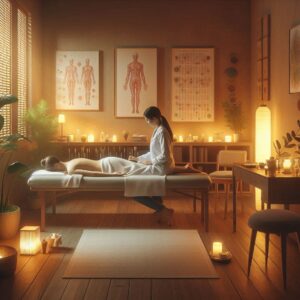Unlock the Secrets of Acupuncture for Relieving Insomnia Effectively
Insomnia is a common yet distressing sleep disorder characterized by difficulties in initiating sleep, maintaining sleep, or achieving restorative sleep. This condition can present itself as a temporary issue that lasts a few nights or weeks, or it can develop into a persistent problem that lingers for months or years. Various factors play a role in the emergence of insomnia, including stress, persistent worry, underlying depression, inconsistent sleep routines, certain medications, excessive caffeine intake, and other health issues. Gaining insight into these triggers is essential for formulating effective treatment plans that target the restoration of healthy sleep patterns and overall well-being.
The ongoing struggle with insufficient sleep can have significant repercussions on both physical and emotional health. From a medical perspective, chronic sleep deprivation can weaken the immune system, escalate the risk of heart disease, increase vulnerability to diabetes, contribute to obesity, and impair cognitive functions such as attention and memory. Additionally, inadequate sleep can trigger heightened anxiety, exacerbate depressive symptoms, disrupt mood stability, and lead to irritability, all of which can severely affect one's mental health. Effectively recognizing and addressing the underlying causes of insomnia is vital to alleviate these negative health implications and restore a sense of overall well-being.
Essential Insights About Insomnia and Its Health Implications
- Insomnia is a complex sleep disorder marked by challenges in falling asleep, staying asleep, or waking too early.
- Multiple factors can incite this condition, including stress, anxiety, depression, poor sleep hygiene, and certain medications.
- Chronic sleep deprivation can severely hinder health, resulting in a compromised immune system, elevated risk of chronic illnesses, reduced cognitive abilities, and mood disruptions.
- Acupuncture promotes better sleep by targeting specific acupoints that help regulate the body’s energy flow and encourage relaxation.
- Research supports that acupuncture can enhance sleep quality and alleviate various insomnia-related symptoms effectively.
- This ancient practice combats insomnia by alleviating anxiety, promoting relaxation, and restoring balance to the body’s energy system.
- Studies indicate that acupuncture may stimulate melatonin production, help regulate the sleep-wake cycle, and improve overall sleep quality.
- Common acupoints utilized in insomnia treatment include Shenmen, Sishencong, Anmian, and Yin Tang.
- Skilled acupuncturists employ fine needles to stimulate designated points, fostering calmness, reducing stress, and enhancing sleep quality.
- Acupoints like Shenmen are recognized for their calming effects, while Anmian is particularly effective in soothing the mind and promoting sleep.
- Traditional Chinese medicine principles emphasize maintaining balanced energy flow and harmony between yin and yang for optimal sleep.
- Incorporating herbal remedies such as chamomile, valerian root, and lavender, along with dietary changes like warm, easily digestible foods, can greatly improve sleep quality.
- Integrating TCM techniques such as acupressure, herbal treatments, and Qi gong can complement acupuncture in effectively managing insomnia.
- During an acupuncture session for insomnia, the practitioner will conduct a thorough consultation to understand your sleep habits, lifestyle, and overall health profile.
- The insertion of fine needles into targeted acupoints aims to foster relaxation, alleviate stress, and enhance overall sleep quality.
- Multiple sessions over weeks or months may be essential to achieve optimal results in treating insomnia.
- Creating a sleep-friendly environment involves minimizing noise and light disruptions, maintaining a comfortable temperature, and incorporating relaxation techniques such as meditation or deep breathing.
- Establishing a consistent sleep routine, steering clear of caffeine and electronic devices before bedtime, and engaging in regular physical activities can significantly boost sleep quality.
- Practicing stress management techniques like yoga, meditation, or tai chi can enhance the effectiveness of your insomnia treatment.
- Collaborating with healthcare professionals such as psychologists, nutritionists, or sleep specialists can effectively integrate acupuncture with diverse insomnia management strategies.
- Complementary therapies like yoga, meditation, or massage can promote relaxation, alleviate stress, and improve sleep quality.
- Addressing underlying health concerns such as anxiety, depression, or chronic pain is crucial for achieving comprehensive relief from insomnia.
 Understanding How Acupuncture Enhances Sleep Quality
Understanding How Acupuncture Enhances Sleep Quality
Acupuncture has been revered throughout history as a vital element of traditional Chinese medicine (TCM), celebrated for its soothing effects and capability to induce restful sleep. This holistic approach places emphasis on regulating the body's energy flow, commonly referred to as qi, through the stimulation of specific acupoints. By influencing the neurological system, reducing levels of stress and anxiety, and rectifying internal imbalances that may contribute to insomnia, acupuncture proves to be highly effective in improving sleep quality. This ancient technique not only helps decrease the frequency of nightly awakenings but also promotes an overarching sense of peace and well-being, thereby enhancing the restorative functions of sleep.
Extensive scientific investigations and clinical trials have consistently underscored the positive impact of acupuncture on sleep quality. A significant study published in The Journal of Alternative and Complementary Medicine revealed that patients suffering from insomnia reported remarkable improvements in their sleep quality after undergoing acupuncture treatment. Moreover, research findings in the Journal of Sleep Research corroborated that acupuncture effectively diminished the severity of insomnia while enhancing overall sleep quality. These compelling results highlight acupuncture's promise as a safe and natural therapeutic avenue for individuals contending with sleep disturbances.
Identifying Key Acupuncture Points for Enhanced Sleep Quality
Seasoned acupuncturists utilize specific acupoints to effectively combat insomnia and improve sleep quality. These strategically chosen acupuncture points play a pivotal role in addressing sleep-related difficulties. For instance, the Shenmen point, located on the wrist, is renowned for its ability to induce tranquility and relaxation for both the mind and body. Another crucial point, Sanyinjiao, located on the inner thigh, is believed to nourish blood and yin, leading to a reduction in anxiety and enhanced relaxation. Additionally, the Anmian point, situated behind the ear, is frequently employed to tackle insomnia and encourage a peaceful night’s rest. The Yintang point, located between the eyebrows, is well-known for its calming effects on the mind.
During acupuncture treatments, practitioners carefully insert fine needles into the skin at precise depths to stimulate these key points. This targeted stimulation is believed to aid in regulating the body's energy flow, fostering a sense of equilibrium and harmony. Consequently, many individuals experience a notable reduction in insomnia symptoms and a marked improvement in sleep quality.
Uncovering the Holistic Foundations of Traditional Chinese Medicine for Improved Sleep
Traditional Chinese medicine (TCM) adopts a holistic perspective on health, recognizing the intricate connections between bodily systems and the critical importance of balance for optimal wellness. TCM principles related to sleep focus on restoring inner harmony to promote restful sleep. Herbal remedies play a significant role in addressing imbalances that lead to sleep disturbances. Herbs like valerian root, chamomile, lavender, and passionflower are acclaimed for their calming properties, assisting individuals in achieving more restorative sleep. These natural solutions are believed to promote relaxation within the body and enhance sleep quality.
As part of their approach, TCM practitioners frequently provide dietary guidelines aimed at improving sleep quality. Individuals struggling with sleeplessness are often encouraged to consume foods that nourish both the blood and yin. Such beneficial options may include dark leafy greens, nuts, seeds, and seafood. Additionally, practices like Qigong, tai chi, and acupressure, along with other TCM therapies, can effectively mitigate insomnia by fostering relaxation, reducing stress, and enhancing overall well-being, ultimately leading to improved sleep quality.
 What to Anticipate During Your Initial Acupuncture Session for Insomnia
What to Anticipate During Your Initial Acupuncture Session for Insomnia
Upon arriving for your first acupuncture session aimed at addressing insomnia, the acupuncturist will perform a thorough evaluation of your sleep habits, general health, and any underlying factors contributing to your sleep issues. Utilizing their expertise, the acupuncturist will create a personalized treatment plan tailored to your unique needs and challenges.
The acupuncture treatment experience involves the gentle insertion of fine needles into designated points on the body. Typically, patients are encouraged to relax for 20 to 30 minutes while the needles remain in place. During this period, individuals may experience a light tingling sensation or mild discomfort, but overall, the experience is often described as soothing and calming.
The frequency and timing of acupuncture sessions may vary depending on the severity of insomnia and individual responses to treatment. Some patients may observe improvements in their sleep quality after just a few sessions, while others may require ongoing treatment for more sustainable results.
Adopting Lifestyle Changes to Maximize Acupuncture's Effectiveness for Insomnia
In addition to acupuncture, implementing specific lifestyle modifications can greatly enhance your overall sleep quality. Establishing a sleep-friendly environment is crucial for optimizing your sleep experience. This involves ensuring that your bedroom is dark, quiet, and serene, utilizing comfortable bedding and pillows, and developing a calming bedtime routine that signals to your body that it’s time to unwind and sleep.
Embracing healthy habits can significantly improve your sleep quality. This includes maintaining a consistent sleep schedule, steering clear of caffeine and electronic devices before bedtime, incorporating regular physical activity into your daily routine, and practicing relaxation techniques like deep breathing or meditation to calm your mind.
Effectively managing stress can greatly enhance the outcomes of acupuncture treatment for insomnia. Engaging in activities such as yoga, meditation, or massage therapy can help alleviate anxiety and promote relaxation. These practices provide essential support in helping you unwind, making it easier to both fall asleep and stay asleep throughout the night.
 Integrating Acupuncture with Other Effective Strategies for Managing Insomnia
Integrating Acupuncture with Other Effective Strategies for Managing Insomnia
With the guidance of a knowledgeable practitioner, acupuncture can serve as a valuable component in a holistic strategy for managing insomnia, providing relief for those grappling with sleep disorders. Collaborating with other healthcare professionals, such as primary care physicians or mental health specialists, is crucial for delivering comprehensive care to individuals experiencing insomnia.
By merging acupuncture with complementary practices like yoga, meditation, and massage therapy, individuals can create a well-rounded strategy for promoting relaxation and reducing stress, which leads to improved sleep quality. These techniques can be seamlessly integrated into a customized treatment plan designed to address each individual's unique needs, ensuring they feel valued and understood throughout their healing journey.
Furthermore, it is essential to address any underlying health issues that may be contributing to insomnia. Tackling chronic pain, anxiety, depression, or other medical conditions that disrupt sleep quality can be a vital part of the treatment process. Those who adopt a holistic approach to their health and well-being can significantly enhance both their sleep quality and overall quality of life.
Ultimately, insomnia can profoundly affect both physical and emotional health, highlighting the importance of exploring effective treatment options. A skilled practitioner can utilize acupuncture to enhance sleep quality by addressing imbalances within the body and cultivating a sense of tranquility. By integrating lifestyle adjustments, principles of traditional Chinese medicine, and other complementary therapies, acupuncture can significantly improve both sleep quality and overall well-being, fostering hope and optimism for individuals seeking relief from insomnia.
 Frequently Asked Questions About the Connection Between Acupuncture and Insomnia
Frequently Asked Questions About the Connection Between Acupuncture and Insomnia
What is Acupuncture and What Are Its Benefits for Sleep?
Acupuncture is a time-tested practice rooted in traditional Chinese medicine, where skilled practitioners delicately insert thin needles into specific points on the body. This technique fosters the flow of energy and supports the body’s natural healing processes, effectively alleviating various health challenges, including insomnia, by promoting a sense of relaxation and balance.
How is Insomnia Defined and Recognized?
Insomnia is a complex sleep disorder that can hinder the ability to fall asleep, stay asleep, or achieve restorative sleep. This persistent condition often leads to daytime fatigue and diminished functionality, making it crucial to seek effective treatment to restore healthy sleep patterns.
How Does Acupuncture Help in Overcoming Insomnia?
Acupuncture has been shown to positively impact insomnia by restoring balance to the body’s nervous system, alleviating stress and anxiety, and inducing a state of profound relaxation. This holistic approach ultimately enhances both the quality and duration of sleep, making it a potent treatment option for those struggling with sleep disturbances.
Are There Scientific Studies Supporting Acupuncture's Effectiveness in Treating Insomnia?
Numerous studies suggest that acupuncture can enhance sleep quality and alleviate insomnia symptoms. While the evidence supports its benefits, further research is necessary to solidify these findings and establish more definitive conclusions regarding its effectiveness.
What Can I Expect During an Acupuncture Session Focused on Insomnia?
During an acupuncture treatment, a skilled practitioner carefully places slender needles into specific points on your body associated with promoting sleep and relaxation. The needles are typically left in place for 15-30 minutes while you unwind and find your inner peace.
Are There Any Potential Side Effects Linked to Acupuncture for Insomnia?
When performed by a trained and experienced practitioner, acupuncture is generally safe. However, some individuals may experience minor side effects, such as tenderness, slight discoloration, or minor bleeding at the needle insertion sites.
Can Acupuncture Be a Standalone Treatment for Insomnia?
Acupuncture can be an effective treatment for insomnia when combined with complementary approaches such as lifestyle changes, relaxation techniques, and cognitive behavioral therapy for insomnia (CBT-I), creating a comprehensive treatment plan that addresses all contributing factors.
How Many Acupuncture Sessions Are Typically Needed to Notice Improvements in Insomnia?
The number of acupuncture sessions required to observe improvements in insomnia varies based on individual circumstances and the severity of symptoms. Many individuals notice enhancements after just a few sessions, while others may require ongoing treatment for sustained effects over time.
Brought To You By:
References
If You Only Get 3 Hours of Sleep One Night – What Happens – Themes Quality. https://www.themesquality.com/what-happens-if-you-only-get-3-hours-of-sleep-for-one-night/
Sleep Better with 30 Essential Oils: A Natural Remedy for Insomnia and Restless Nights – Hotnewamapiano. https://hotnewamapiano.com/2023/02/11/sleep-better-with-30-essential-oils-a-natural-remedy-for-insomnia-and-restless-nights/
Migraines Helped by Acupuncture. https://www.ncbi.nlm.nih.gov/pmc/articles/PMC3291665/
The Article: Acupuncture Techniques for Improving Sleep Quality appeared first on Acupuncture Blackpool.
The Article Acupuncture Techniques for Better Sleep Quality appeared first on https://mcrtherapies.com
 What to Anticipate During Your Initial Acupuncture Session for Insomnia
What to Anticipate During Your Initial Acupuncture Session for Insomnia Integrating Acupuncture with Other Effective Strategies for Managing Insomnia
Integrating Acupuncture with Other Effective Strategies for Managing Insomnia Frequently Asked Questions About the Connection Between Acupuncture and Insomnia
Frequently Asked Questions About the Connection Between Acupuncture and Insomnia




Comments are closed